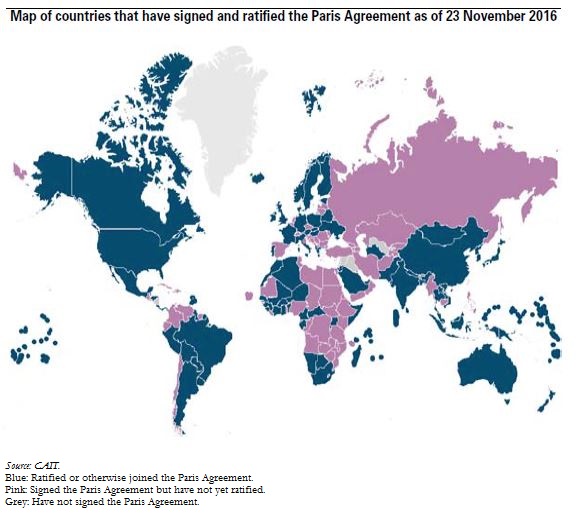Trésor-Economics No. 187 - Economic analysis of the Paris Agreement
While traditional economic approaches in international climate agreements differ in some respects, they are all based on three main principles:
- Universality: Because the causes and consequences of climate change are global, all countries must participate in efforts to reduce greenhouse gas emissions, with no free riders.
- Efficiency: To achieve the greenhouse gas (GHG) reduction objective at least cost, the economic instruments used must be consistent with a uniform global carbon price.
- Equity: In global negotiations for a mechanism culminating in a global carbon price, efforts must be shared among countries in accordance with an equity principle that all parties accept.
Yet the failure of the Copenhagen climate talks showed that in a world of sovereign States, each holding a de facto veto, international discussions on the sharing of a global carbon budget or a global carbon price are unlikely to succeed. Climate talks are subject to real-world constraints, and an international negotiation is not conducive to determining which fairness principle should be adopted.
A polycentric approach, based on immediate actions to reduce GHG emissions at multiple levels – global, national and subnational – may be justified by economic analysis, even if the analysis is not based on the conventional approach. The polycentric approach allows for implementation of different types of policies, so that the resolution of the problem no longer depends on a single solution whose failure would be catastrophic. Lastly, the risk of free-riding is limited by the local co-benefits arising from the reduction in GHG emissions, such as lower air pollution and a reduced energy bill.
The Paris Agreement, which entered into force on 4 November 2016, embodies this kind of polycentric approach. It allows for universal participation, overcoming the obstacle of "fair effort sharing" by enabling each State to determine what it considers to be its fair contribution. It recognizes the impossibility of setting up an international enforcement system with sanctions and therefore turns to incentives supported by peer pressure and civil society. The "global stocktake" every five years provides an opportunity to review the national contributions and to encourage higher ambition in order to achieve the Agreement's long-term objective: global picking of emissions in the near future, and then achieving zero or negative net emissions in the second half of the century.
The success of the Paris Agreement in achieving its long-term objective, however, will depend primarily on building greater trust and confidence across countries, and therefore on the transparency of the actions conducted. It will also depend on seeking greater efficiency by mobilising appropriate economic instruments effectively.
